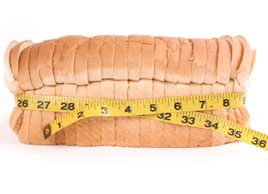Q&A: The real reason why we get fat
In his new book, Why We Get Fat, author Gary Taubes argues that the real reason we get fat is simple: we eat too many carbs

Source: Web exclusive, February 2011
Science writer Gary Taubes says that the key to weight loss is no great mystery’simply cut the carbs from your diet and the weight will come off. But haven’t we heard that before? Low-carb weight-loss plans like Atkins and South Beach were all the rage in the early 2000’s, but they’ve since gone the way of many fad diets like the Cabbage Soup and Grapefruit diets. But in his new book, Why We Get Fat, Taubes, a best-selling book author and contributing correspondent for Science magazine, argues that foods rich in carbohydrates are the main cause of the obesity epidemic. While some medical experts claim that cutting carbs can be unhealthy, Taubes says that, according to his research, everyone’s diet should essentially be low in breads, grains and even fruits. Best Health spoke with Taubes about his book and why he contends that carbs make us fat.
Best Health: What’ are some of the biggest mistake people make when trying to lose weight?
Gary Taubes: Trying to eat less and exercise more. The reason people are fat to begin with isn’t because they eat too much and exercise too little. The reason people get fat is because their fat tissue gets unregulated. Fat-tissue regulation is controlled by the hormone insulin, and we secrete insulin in response to the carbohydrates we consume. The reason we get fat is because of carbohydrates; they literally are fattening. So if you don’t want to be fat, you don’t eat them.
The second mistake is low-fat diets. These diets are high-carboydrate diets by definition. If you just try to cut fat your of your diet [without cutting calories] then you’re going to raise carbohydrates. So now what you’re doing to lose weight is doing the exact opposite.
BH: What is it about carbs that makes us fat?
GT: Carbohydrates used to be considered uniquely fattening. In my book, I quote a line from an article written by one of the leading dietitians in a 1963 issue of the British Journal of Nutrition: "Every woman knows that carbohydrates make them fat." This was the conventional wisdom up until the 1960s.
Fat accumulation in the human body is, for all intents and purposes, controlled by the hormone insulin. So when you secrete insulin, you store calories as fat and when insulin levels come down, you release the fat and burn it. We secrete insulin in response to carbohydrates in the diet. If you look in a medical text book, it will tell you that insulin makes fat cells fat. It’s never been controversial that in order to get rid of fat, you have to lower insulin levels. And if you’re genetically predisposed to put on weight, eating carbs is the number-one trigger.
BH: Low-carb diets were quite popular about 10 years ago, but they’ve since been abandoned. Why have they fallen out of favour?
GT: Well, because the establishment hates them. The problem is that people go on the diet and not only do their doctors tell them that they’re killing themselves, but the doctors say it’s quackery and all your friends think you’re a food zealot. So there’s zero positive feedback, except that you lose weight and you feel better.
And there’s also a rhythm to the press, so first [they say] that the Atkins diet is great and everyone’s doing it, and then they say it’s out of fashion. But you could go into a restaurant and ask the server how many people ask that the bread not be brought to their table, and you’ll find that a lot of people nowadays simply don’t eat the bread on the table because they think it’s fattening. There’s a large low-carb community on line’there are tons of low-carb websites.
BH: Why do doctors think that low-carb diets are quackery?
GT: They believe saturated fat causes heart disease and it does so by raising LDL or so-called "bad" cholesterol. And these low-carb diets tend to be high in saturated fat because you’re eating eggs, butter and meat. You don’t have to eat those foods on a low-carb diet’the fundamental idea is that some carb-rich foods are fattening so just don’t eat those foods. You could be a vegetarian or a vegan and improve your diet by getting rid of the sweets, white bread and potatoes.
Another problem is that doctors believe that diets shouldn’t be too restrictive because then people don’t stay on them. The metaphor I use to dispute that is that cigarettes cause lung cancer, just as certain carb-rich foods make us fat. If a doctor’s got a patient who is smoking cigarettes, he doesn’t care how much his enjoyment of life is going to be diminished if he quits smoking. He just says, ‘Look, if you don’t want to get lung cancer, don’t smoke.’
BH: Should everyone follow a low-carb diet?
GT: For someone who is lean to begin with, the message is to not go crazy with carb-rich foods. It’s not that pasta is inherently bad and if you’re lean, you can obviously tolerate it. So if you’re 10 pounds overweight, maybe all you have to do is stop eating pasta every night. But someone who is 100 pounds overweight may not be able to tolerate any carbs. However, another issue is that obesity, heart disease diabetes, cancer, Alzheimer’s’all of these diseases cluster together. They used to be known as diseases of civilization, but now they’re considered diseases of the Western diet. The way the medical community thinks of it is that first you start getting fat and the weight increases your risk of getting these diseases. Another way to think of it is that whatever makes you fat to begin with also causes these diseases. Even if these carb-rich foods don’t make you personally fat, it’s likely that they are the cause of these diseases. Studies have never been done, but there are very good people in the cancer research field who think that sugar and refined carbohydrates are probably the cause of cancer and don’t eat them for that reason.
BH: In the back of your book you describe a low-carb menu plan and it is very light on fruits and vegetables. But that goes against the predominant nutrition advice, which is to increase fruit and vegetable consumption. Can a diet low in these foods really be healthy?
GT: It all depends on what you can personally tolerate. Somebody who is 100 pounds overweight might not be able to eat any fruit because the carbs and the fructose in the fruit might trigger an insulin response that keeps them fat. Even green vegetables could be too much depending on how sensitive they are to the carbs. Right now we have this blanket recommendation that everyone should eat as much fruits and vegetables as they want. But the problem is that lean people are different from fat people. Someone who is very overweight has to figure out what they can tolerate.
BH: What are your tips for someone who wants to get started on a weight-loss diet?
GT: It’s not about what you eat, it’s about what you don’t eat. So the first thing I would do is get the sugar, high-fructose corn syrup and beer out of the diet. The second thing is to get rid of the starches and the grains’the bread, pasta, potatoes and rice. Those are literally fattening. And the third thing I would recommend is to not worry about fat. Fat is actually the one nutrient that doesn’t stimulate insulin secretion.
BH: What will you eat for dinner tonight?
GT: Well, I’m travelling, so hopefully I’ll be able to find a restaurant open late where I can get a steak and brocoli or other green vegetable. It’s hard to see how that could be healthier.




